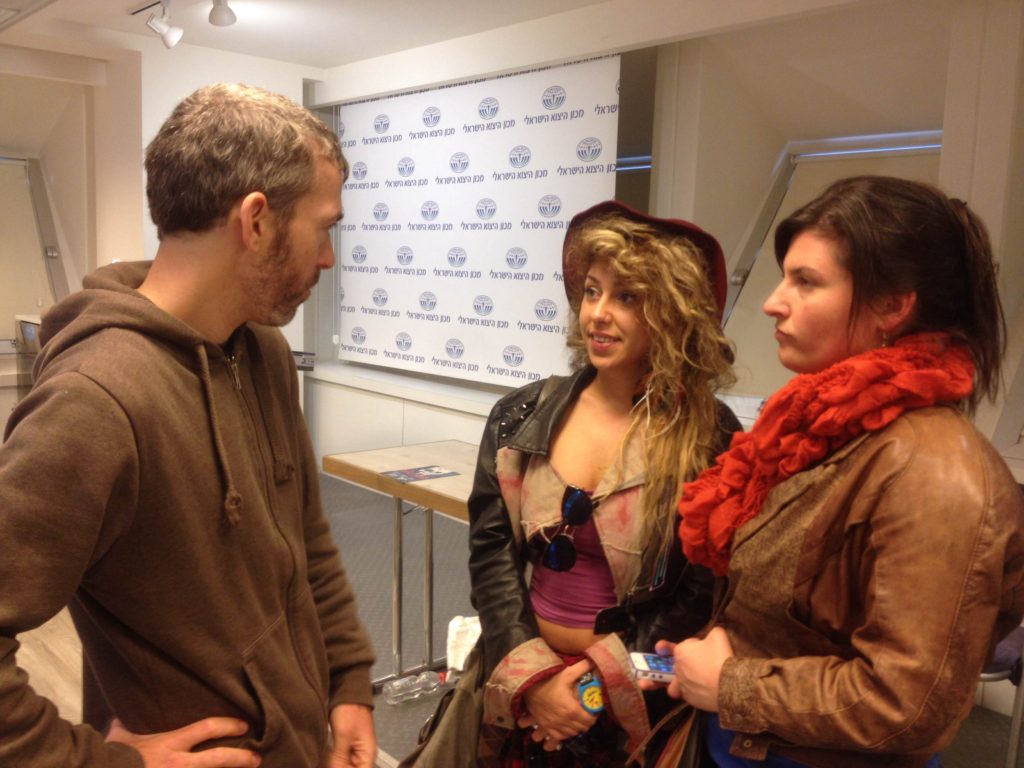Jerusalem Post, Metro Section, January 1, 2016
For the PDF, click here.
For the online version, click here (for subscribers).
TEL AVIV – If you’re an artist and want to succeed in the music industry abroad, then you need to really, really try.
That was the overwhelming message at the Exporting Israeli Music conference held by the Israel Export Office at its offices in Tel Aviv on December 15, where industry leaders from Israel and abroad gave practical and inspirational tips on how to “break out” internationally.
“Unfortunately, 90 percent of us are waiting for the knock on the door because we have something special,” American rocker Marco Mendoza told the rapt, ambitious crowd of dozens of solo artists, band members and music producers. The singer and bassist (Whitesnake, Black Sabbath), with his distinctive scraggly black hair, tattooed arms, and plenty of bling, had taken time off touring in Israel with the rock band Dead Daisies to inspire local musicians.
Artists must dedicate at least two to three hours to the business side of their craft, Mendoza said, a sentiment shared by Yossi Mizrachi, who recently left the Israeli band Acollective to pursue a solo career and to work with his wife, pop star Ninet Tayeb.
“It requires a lot of energy and you can get tired and mentally exhausted. You have to have a plan,” Mizrachi said, recalling his travels to the UK, where he and his bandmates consistently set up gigs, submitted their music to blogs and festivals, and hustled for networking opportunities, until they finally conquered the festival scene and developed a reputation as one of Israel’s hottest musical exports with its self-described mix of “boogied-folk, electronic- jazz and a Middle Eastern-bluesy twang.”
Succeeding abroad, Mizrachi said, usually requires relocation, where, to get noticed, an artist must generally start out as that proverbial struggling artist. Mizrachi recommended that artists focus on either Europe or America, since markets vary from place to place, and integrating into a music scene takes time. Practical decisions, such as visa requirements and cost of living, may also affect an artist’s choice. Legal tips were doled out by conference co-organizer and sponsor Eyal Brook, an attorney specializing in the creative field, also a musician himself.
But in the US, artists have an extra advantage: being Israeli, said Jonathan Schwartz, a former manager and CEO of Dreampatron, an agency that assists artists. He said the Israeli Consulate sometimes provides assistance to Israeli artists, and campus Hillels and Jewish organizations are natural venues to tap for paying gigs.
“By the sheer fact that you’re coming from Israel, you’re authentic Israeli programming,” Schwartz said. “Don’t be afraid to be an Israeli artist and use that as a badge of honor when you go to America.”
Roie Avidan, brother and former manager of crossover artist Asaf Avidan, recommends Berlin as an entry-level city, in part for its affordable cost of living, its strong music scene, and – yes – German “guilt” which enhances Berliners’ openness to Israeli artists.
“You could move to Berlin tomorrow,” he said.
Asaf Avidan himself made it big in Berlin when a remix of his song “Reckoning Day” by a German DJ in his 20s, Wankelmut, reached the top of the charts and YouTube viral stardom with 171 million views to date. But, Avidan said, that win was a culmination of countless hours of “bleeding” money producing, networking and touring.
“You’re not in it for the money,” Avidan said. “Artists are in it for the art, and managers too, although they want to monetize the art.”
Artists should not underestimate the importance of social media for getting noticed and building their validation as an artist. The more likes, views and fans you have, the more venues, managers and labels will take notice.
“It’s definitely part of the story that can help you abroad,” Schwartz said.
That crossover superstar has yet to emerge from Israel, although recent decades have seen some small-scale wins. Idan Raichel and Achinoam Nini have developed a cadre of fans in their respective genres. Yael Naim made headlines when “One Soul” peaked at seventh on the Billboard charts and was placed in an Apple commercial.
Schwartz listed other artists who have made headway: Coolooloosh, Geva Alon, Habanot Nechama, Onili, Paula Valstein, Rockfour, Tal Cohen Shalev, and Zvuloon Dub System.
In light of such successes, the Export Institute is doubling its efforts to get Israeli musicians out there.
“In the last few years, the Export Institute has identified the field of music as an export field, and is working to advance Israeli musicians through international festivals and events and through bringing experts in the field to Israel,” said Mira Geshel, manager of the film, TV and music department.
Nazareth-born soul and blues singer Dana Likvornik, is already reaping the benefits. Had she attended a conference like this years ago, she said, she might have saved herself from treading water as an artist.
“These days, it’s not just about talent. It’s about multitasking,” said the chanteuse, wearing an eclectic, funky ensemble befitting an artist.
Having performed at prominent live music venues in Jerusalem and Tel Aviv, the Grammy-aspiring singer said Israel is no longer a challenge for her. After raising some money through crowdfunding, she recently recorded her second indie album in London, where she has dreams of recording with Salaam Remi, Amy Winehouse’s producer. Having also checked out the music scene in Los Angeles, she noticed another advantage to pursuing a career abroad rather than in the Jewish state.
“There, you’re blessed; here, you’re broke.”
Curly-haired, Moldovan-born singer Tania Vinokur recently came back from Amsterdam where she performed her distinctive violin-electro act. She has set her sights on Madison Square Garden, but she doesn’t see herself living abroad for extended periods, nor does she think it’s required.
“The best moments of my creativity happen here,” said Vinokur. “I still feel very, very attached to this country, because all of this fusion of music and my art is happening here.”
But as charismatic, connected and hardworking as artists are or can be, Schwartz said there’s one thing they can’t compromise if they want to make it big outside of the Holy Land.
“Be awesome,” he said. “You’re music has to be amazing, not just good. Not just decent. Not just ‘I have a few fans.’ Your music has to be great.”

